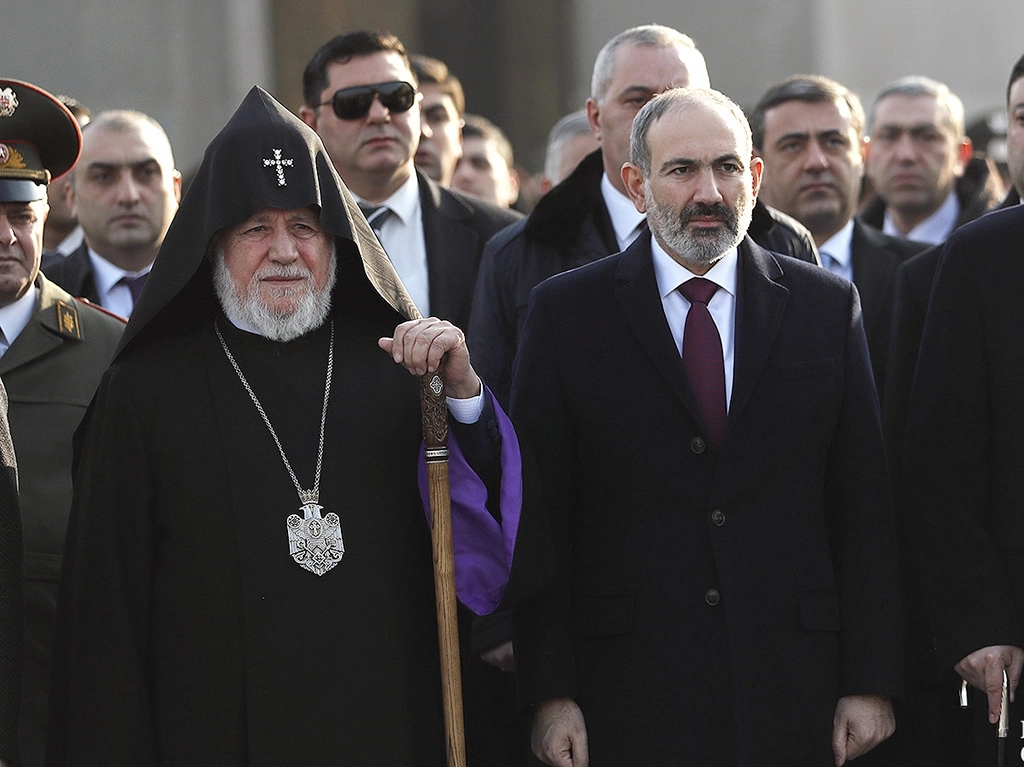An Easter of tensions between the Church and the Prime Minister in Yerevan
Pašinyan 'preaches' using psalms and gospel images to defend his policy. Karekin II and the clergy reply that his task is to 'heal the wounds of his people who have suffered great losses'. Behind the clash is the wound of the renunciation of Nagorno Karabakh while tensions with Azerbaijan have risen again.
Yerevan (AsiaNews) - Many priests of the Armenian Apostolic Church reacted to the "political sermon" of Prime Minister Nikol Pašinyan during the Easter celebrations, which in Armenian is called Zurb Zatik, "Liberation from Suffering" and is celebrated according to the Gregorian calendar, as the Armenians did not follow the Orthodox of the Byzantine tradition in defending the "old calendar". The patriarch himself, the Katholikos Karekin II, in his Easter message warned the faithful that "we find ourselves in difficult times full of unexpected events for Armenia".
On the evening of Easter Eve, Čragalujts, Pašinyan met with members of his Civil Accord party in the city of Artašat, the administrative center of the Ararat region, and during the discussion he unexpectedly resorted to Jesus' Sermon on the Mount, declaring that "the political dimension of the foundations of Christianity is no less important to me than the spiritual one", since "Jesus Christ is not only the Son of God, but also the ideal figure of the leader".
The Lord was also "a great revolutionary, who for a certain period went around the world, changing it profoundly with his actions". The prime minister then compared the fate of the Savior with that of his party, which several times "died" and then "always rose again", seeing a particular meaning in the words of the Gospel which proclaim "Blessed are those persecuted for justice, since they is the Kingdom of Heaven", words "which have always given me so much strength in the most difficult moments", concluded Pašinyan.
In recent days several members of the clergy have commented on these words, starting with the head of the information service of the curia of Ečmjadzin, the patriarchal seat, the priest Esai Artenyan, who recalled how "Christ was crucified precisely because he did not want to be a revolutionary, and take power... in the Gospel there are many testimonies to the fact that the Jews wanted Jesus to become king, but the Lord refused, they hoped that he would lead them to revolt against the emperor and free them from the yoke of the Romans, but Christ is the heavenly king, as He himself has explained several times". Fr Esai did not mention Pašinyan's name, but his followers on social networks understood who he was referring to.
Moreover, it is not the first controversy that has arisen between the prime minister and the Armenian Church, and Pašinyan even refused to participate in the Easter celebrations, limiting himself to greeting all believers in a short video published in the previous days, in which instead of to congratulate him he read the text of Psalm 25, “Lord, do me justice, in integrity I have walked”. The prime minister began quoting passages from religious literature in his speeches a few years ago, without explaining the reasons.
While Pašinyan held his "sermon on the mountain" at the foot of Ararat, Patriarch Karekin II led the faithful in the procession of the vigil with the lamps lit from the Paschal candle, and even in his homily there was no shortage of comments on the political situation, urging the faithful to "give the right response to the realities that afflict us, the task of our people is to overcome internal divisions and lack of communication, heal the wounds of the people who have suffered serious losses, strengthening the homeland by joining forces" . The grace of the Risen One must ensure that "we are not reduced to being a weak and disconsolate nation, which endangers the future and independence of our homeland".
The Church has always criticized the government's surrender on the issue of Artsakh, the "land of our warriors and our martyrs", recalled the katholikos. In Nagorno Karabakh there are "the tombs dug for us wicked people, but the tomb of those who overcome the anguish of death together with Christ is empty, we believe in the resurrection". The words of the leader of the Armenian Christians resonated as an appeal to resume the fight against the enemy, precisely in the days in which the border conflicts with Azerbaijan are renewed. In Armenia politicians speak with the verses of the psalms and gospels, while the priests use the language of politics and war.
07/02/2019 17:28







.png)










